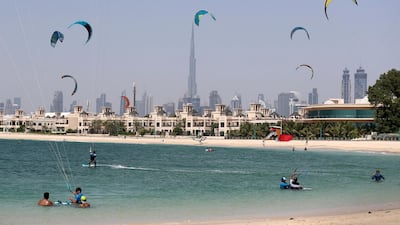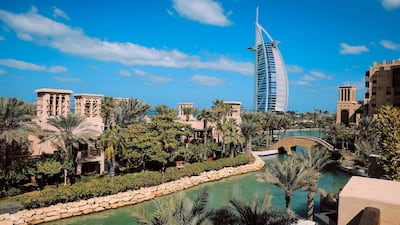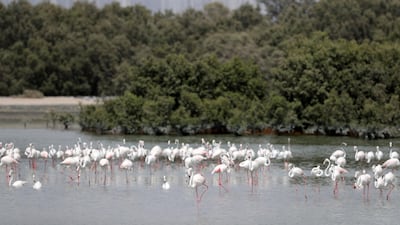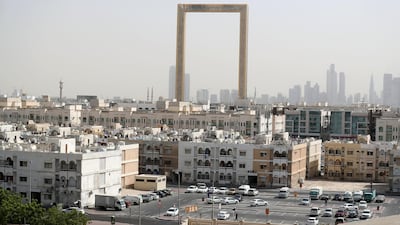A visa that allows residents of other countries to retire in Dubai was announced by the emirate's government on Wednesday.
The five-year retirement visa allows Dubai residents and citizens from around the world to live in the emirate provided they meet criteria.
Eligible applicants must be older than 55 and have valid UAE health insurance.
Applicants must also fulfil one of these three requirements: earn a monthly income of Dh20,000; have Dh1 million in cash savings; or own Dh2m worth of property in Dubai.
Retired expatriates and their spouses can apply for the five-year visa with the possibility of automatic renewal online, provided the retiree continues to meet the criteria.
Applications can be submitted on the Retire in Dubai website.
The website says valid UAE health insurance must be bought at least a day before an application is submitted.
If the application is not accepted, health insurance providers will offer a 30-day refund period after purchase.
The programme was developed by Dubai Tourism and the General Directorate for Residency and Foreigners Affairs, on the orders of Sheikh Mohammed bin Rashid, UAE Vice President and Ruler of Dubai.
It aims to make Dubai a preferred retirement destination.
The initial phase of the programme will focus on residents of the country who have worked in Dubai for more than 10 years.
"The programme offers long-term residents of the city who are familiar with Dubai’s value proposition an easy and hassle-free retirement option," Dubai Media Office said.
"Dubai’s close proximity with the native countries of a large majority of residents makes it a convenient retirement destination for them."
Helal Al Marri, director general of Dubai Tourism, said the programme would boost the emirate's tourism economy through frequent visits from families and friends of retirees, and increasing visits from markets with a high population of retired people.
"Dubai’s Retirement Readiness strategy will enable expatriates and international retirees to take advantage of the city’s open-door policy, tolerance and outstanding quality of life, and live in one of the world’s fastest growing, culturally diverse cities," Mr Al Marri said.
In 2018, the UAE Cabinet approved a five-year retirement visa for residents of the country, starting in 2019.
The criteria were the same but appeared to be limited to residents of the country.
Dubai's retirement visa is open to non-residents.
Kill%20
%3Cp%3E%3Cstrong%3EDirector%3A%3C%2Fstrong%3E%20Nikhil%20Nagesh%20Bhat%3C%2Fp%3E%0A%3Cp%3E%3Cstrong%3EStarring%3C%2Fstrong%3E%3A%20Lakshya%2C%20Tanya%20Maniktala%2C%20Ashish%20Vidyarthi%2C%20Harsh%20Chhaya%2C%20Raghav%20Juyal%3C%2Fp%3E%0A%3Cp%3E%3Cstrong%3ERating%3A%3C%2Fstrong%3E%204.5%2F5%3Cbr%3E%3C%2Fp%3E%0A
Results
2.15pm: Handicap Dh80,000 1,950m
Winner: Hello, Tadhg O’Shea (jockey), Ali Rashid Al Raihi (trainer).
2.45pm: Handicap Dh90,000 1,800m
Winner: Right Flank, Pat Dobbs, Doug Watson.
3.15pm: Handicap Dh115,000 1,000m
Winner: Leading Spirit, Richard Mullen, Satish Seemar.
3.45pm: Jebel Ali Mile Group 3 Dh575,000 1,600m
Winner: Chiefdom, Royston Ffrench, Salem bin Ghadayer.
4.15pm: Handicap Dh105,000 1,400m
Winner: Ode To Autumn, Patrick Cosgrave, Satish Seemar.
4.45pm: Shadwell Farm Conditions Dh125,000 1,200m
Winner: Last Surprise, James Doyle, Simon Crisford.
5.15pm: Handicap Dh85,000 1,200m
Winner: Daltrey, Sandro Paiva, Ali Rashid Al Raihi.
UAE currency: the story behind the money in your pockets
BUNDESLIGA FIXTURES
Friday (All UAE kick-off times)
Borussia Dortmund v Eintracht Frankfurt (11.30pm)
Saturday
Union Berlin v Bayer Leverkusen (6.30pm)
FA Augsburg v SC Freiburg (6.30pm)
RB Leipzig v Werder Bremen (6.30pm)
SC Paderborn v Hertha Berlin (6.30pm)
Hoffenheim v Wolfsburg (6.30pm)
Fortuna Dusseldorf v Borussia Monchengladbach (9.30pm)
Sunday
Cologne v Bayern Munich (6.30pm)
Mainz v FC Schalke (9pm)
Sole survivors
- Cecelia Crocker was on board Northwest Airlines Flight 255 in 1987 when it crashed in Detroit, killing 154 people, including her parents and brother. The plane had hit a light pole on take off
- George Lamson Jr, from Minnesota, was on a Galaxy Airlines flight that crashed in Reno in 1985, killing 68 people. His entire seat was launched out of the plane
- Bahia Bakari, then 12, survived when a Yemenia Airways flight crashed near the Comoros in 2009, killing 152. She was found clinging to wreckage after floating in the ocean for 13 hours.
- Jim Polehinke was the co-pilot and sole survivor of a 2006 Comair flight that crashed in Lexington, Kentucky, killing 49.
'Unrivaled: Why America Will Remain the World’s Sole Superpower'
Michael Beckley, Cornell Press
Pharaoh's curse
British aristocrat Lord Carnarvon, who funded the expedition to find the Tutankhamun tomb, died in a Cairo hotel four months after the crypt was opened.
He had been in poor health for many years after a car crash, and a mosquito bite made worse by a shaving cut led to blood poisoning and pneumonia.
Reports at the time said Lord Carnarvon suffered from “pain as the inflammation affected the nasal passages and eyes”.
Decades later, scientists contended he had died of aspergillosis after inhaling spores of the fungus aspergillus in the tomb, which can lie dormant for months. The fact several others who entered were also found dead withiin a short time led to the myth of the curse.
ELIO
Starring: Yonas Kibreab, Zoe Saldana, Brad Garrett
Directors: Madeline Sharafian, Domee Shi, Adrian Molina
Rating: 4/5
Some of Darwish's last words
"They see their tomorrows slipping out of their reach. And though it seems to them that everything outside this reality is heaven, yet they do not want to go to that heaven. They stay, because they are afflicted with hope." - Mahmoud Darwish, to attendees of the Palestine Festival of Literature, 2008
His life in brief: Born in a village near Galilee, he lived in exile for most of his life and started writing poetry after high school. He was arrested several times by Israel for what were deemed to be inciteful poems. Most of his work focused on the love and yearning for his homeland, and he was regarded the Palestinian poet of resistance. Over the course of his life, he published more than 30 poetry collections and books of prose, with his work translated into more than 20 languages. Many of his poems were set to music by Arab composers, most significantly Marcel Khalife. Darwish died on August 9, 2008 after undergoing heart surgery in the United States. He was later buried in Ramallah where a shrine was erected in his honour.
UAE currency: the story behind the money in your pockets
Start-up hopes to end Japan's love affair with cash
Across most of Asia, people pay for taxi rides, restaurant meals and merchandise with smartphone-readable barcodes — except in Japan, where cash still rules. Now, as the country’s biggest web companies race to dominate the payments market, one Tokyo-based startup says it has a fighting chance to win with its QR app.
Origami had a head start when it introduced a QR-code payment service in late 2015 and has since signed up fast-food chain KFC, Tokyo’s largest cab company Nihon Kotsu and convenience store operator Lawson. The company raised $66 million in September to expand nationwide and plans to more than double its staff of about 100 employees, says founder Yoshiki Yasui.
Origami is betting that stores, which until now relied on direct mail and email newsletters, will pay for the ability to reach customers on their smartphones. For example, a hair salon using Origami’s payment app would be able to send a message to past customers with a coupon for their next haircut.
Quick Response codes, the dotted squares that can be read by smartphone cameras, were invented in the 1990s by a unit of Toyota Motor to track automotive parts. But when the Japanese pioneered digital payments almost two decades ago with contactless cards for train fares, they chose the so-called near-field communications technology. The high cost of rolling out NFC payments, convenient ATMs and a culture where lost wallets are often returned have all been cited as reasons why cash remains king in the archipelago. In China, however, QR codes dominate.
Cashless payments, which includes credit cards, accounted for just 20 per cent of total consumer spending in Japan during 2016, compared with 60 per cent in China and 89 per cent in South Korea, according to a report by the Bank of Japan.








